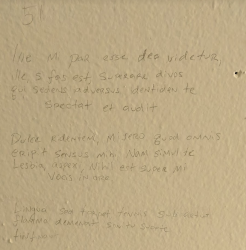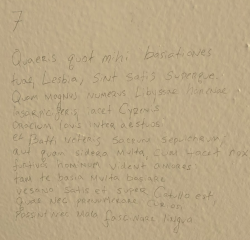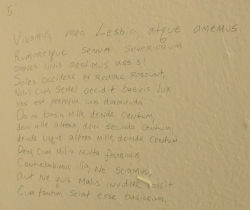Staff writer Nadra Rahman reports on strange phenomena in the Extreme West Campus.
At first, I was scared. The walls of my Woodbridge room were covered in ominous Latin, thin letters penciled with a cramped hand. I thought it was Dante’s Inferno at first, but realized it wasn’t Italian enough, and then I thought it might be The Aeneid, or some other text we had studied in Lit Hum or CC. In the back of my head, I thought it might be an incantation for summoning a demon, which made even more sense when the old building creaked at night.
The room I live in is terrible, by the way—it is bigger than any other room I have had at Columbia, but faces a brick wall. There is no natural light. Within a few days of moving in, I was researching light therapy. So I put off trying to translate the passages, because it was scary to think of this dark room being haunted by the spectre of a Classics major trying to study, or a hardy monster that tolerates low light.
But finally, reluctantly, I entered the passages into Google. Of all the outcomes I had imagined, this was not one of them—they were love poems, not spells.
Three of the passages are above my bed, as pictured here:
- Catallus 51
- Catullus 7
- Catallus 5
They are all by Catullus, a Roman love poet. The first, Catullus 51, is an adaptation of a lyric poem by Sapphos—the one where she burns with love and jealousy over a young woman (“I cannot see anything with my eyes, / and my ears are buzzing / a cold sweat comes over me, trembling / seizes me all over, I am paler / than grass, and I seem nearly / to have died”). Catullus follows the same structure but replaces Sapphos’ unnamed beloved with his own love, Lesbia (“for at the same moment I look upon you, / Lesbia, nothing is left for me.”)
The other two poems are Catallus 5 and 7, additional odes to the poet’s love for Lesbia. He really adores her kisses, because his descriptions of them are plentiful and a bit reminiscent of mid-2000s emo music. In 5 he writes, “Give me a thousand kisses, then a hundred / then another thousand, then a second hundred, / then another thousand, then a hundred…” and so on. In 7, he says he will bestow upon her kisses which “neither the curious can count / nor an evil tongue bewitch.” This man really loves Lesbia’s mouth!!
Anyway, I was really moved by the fact that these three poems were all right above my bed, which I’m sure was intended because there is only one logical placement for a bed in my room. I can really imagine the words of petulant, romantic, manic Catullus echoing across the centuries and nestling in my sleeping, elastic brain.
The other poem was a lot less sweet. It’s Catullus 39, and seems to be a diss track aimed at Egnatius, a man with white teeth who smiles often and insincerely. At the end, Catullus writes, “the more polished those teeth of yours are, / the more urine they proclaim you to have drunk.” That seems a bit harsh! I conducted an ocular analysis and saw that the writing on the wall for this poem was much thicker and darker. The number of the poem was drawn with great boldness and takes up a lot of space, indicative perhaps of a disordered or frantic mind. Did the previous resident of my room transcribe this poem after a heated encounter with someone, keeping them in mind as they bore into the wall?
Were they in love when they wrote the poems on top of my bed? Were they just really emotional, unable to contain their emotions within the margins of a page—forced to expel their feelings onto an expansive campus? When they wrote on the walls in this room that feels like a cave, did they feel a little like a prehistoric human, trying to create art in darkness? Were they driven mad here, unable to access light therapy? Did they have a Lesbia?
Were they trying to memorize passages for a test or presentation? Were they allergic to paper? Were they fined by Housing?
I don’t know, but there’s something very comforting about being ensconced in Catullus’ romantic fervor and measured animosity as I sleep in my Woodbridge cave.
Images via Nadra Rahman


 0 Comments
0 Comments




